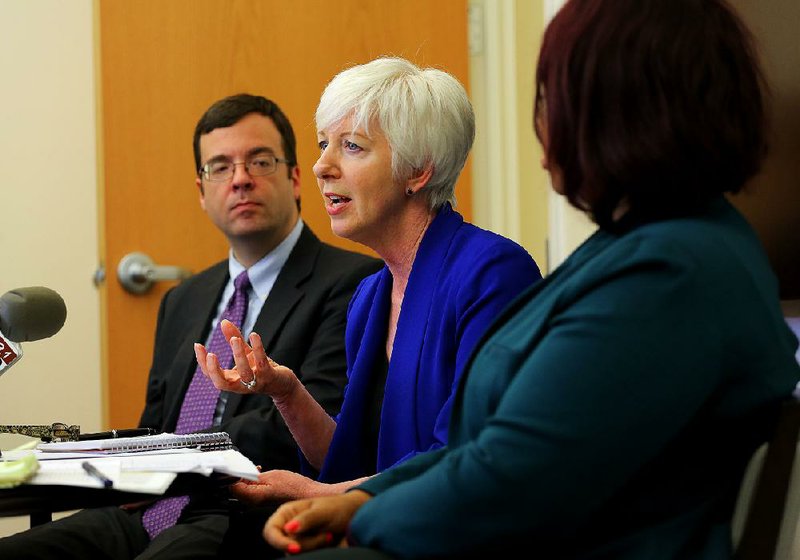The state Department of Human Services would be better served by fewer employees who work more efficiently, are centrally directed and ultimately better compensated, department Director Cindy Gillespie said Tuesday.
Over the course of an hourlong meeting with reporters in her office, she shared her vision for the $8.3 billion-a-year department. She also unveiled a plan to reorganize the department's management.
It was her 99th day on the job.
In that time, she's noticed some problems. For one, she determined that the department needs to see to all needs of its clients, not just what they walked into an office to find out about. She said the department has a 22 percent turnover rate thanks to low pay and poor working conditions. And for as many contracts as the department has, the agency has no professional to write them.
On Tuesday, Gillespie offered a few fixes, like centralizing the organization's structure, and promised other changes down the road. She did not have an estimate for cost savings but said the fixes would save money.
"We have a department that has 10 divisions. Each of these divisions operates various programs -- everything from Medicaid to child welfare or youth services. But each of them also essentially does their own hiring. They all do their own [information technology]. They all do their procurement. They go out and buy their own technology. They buy all their own services," she said.
"We have no consistency across them. We have no consistency in our standards around purchasing. We have none of the savings that would come by pooling what we're doing. We hire and we may be competing with ourselves."
Tuesday's announcement focused on structural changes to the department. Jobs that each division has done individually -- finance, procurement, human resources and information technology -- will be managed by centralized offices.
Also, the Office of Communications and the Community Service and Nonprofit Support Division will be merged to become the Office of Communications and Community Engagement.
The department had announced Monday that Rep. Kelley Linck, R-Flippin, will head a new Office of Legislative and Inter-Governmental Affairs, where communications with lawmakers will be routed. Linck will be paid $108,243 a year.
And the Office of Chief Counsel is unchanged.
Between new positions and raises for existing employees, those office chiefs will collectively cost about an additional $266,000 a year. The department said it is saving money by not hiring people for positions that have not been filled since 2012. Some of the changes must first be approved by lawmakers.
Gillespie, who was a health care adviser to Mitt Romney when he was Massachusetts' governor, earns $280,000 per year -- $120,000 more than her predecessor.
No one will be laid off because of the changes, Gillespie told reporters, but she expected the department to be leaner in coming years because of attrition. Fewer employees should mean better compensation but a decreased overall payroll, she said.
Centralization will allow those with expertise to complete jobs more efficiently, she said.
She used procurement as an example.
"By having our procurement done by a professional procurement corps, I think we are going to see huge savings and changes in the way we go to market," she said. "We do procurements that are worth hundreds of millions of dollars annually, and yet we have not had the ability to write those kinds of [requests for proposals]" from suppliers.
Some high-profile contracts with private companies have gone awry at the department.
Last June, legislators grilled representatives from the Human Services Department and various contractors -- including IBM Curam, Northrop Grumman, eSystems, Red-Mane Technology and EngagePoint -- about why the eligibility verification system for Arkansas Medicaid, food stamps and other social services had been delayed more than eight months and doubled in expected cost.
"We do not do procurement as well as we could," former Human Services Department Director John Selig told the Joint Performance Review panel last year. "At least within DHS, we need more capacity, more training on how to do -- in particular -- [information technology] contracts."
The chairman of the Legislature's Joint Performance Review Committee, Rep. Kim Hammer, R-Benton, said Tuesday that he supported Gillespie's changes, "but the devil is in the details."
"I think the future of DHS has gotten a little bit more encouraging knowing we're going to run it like a business, which is more about customer service than feeding the beast," he said. "We've been dealing with the issues of not having the kind of structure that's being proposed."
He noted contracting and competitive bidding were areas that needed improvement.
Gillespie said Tuesday that those failures were not the reason for the restructuring but "the most striking examples of the kinds of problems that are created when you don't centralize."
She said her department needs to have the skills to handle those sorts of complex tasks in-house.
"We can do this ourselves," she said. "Why go outside and pay for it?"
She said she did not renew consulting contracts with McKinsey & Co. and DataPath collectively worth more than $23 million.
Planning will now be done by an office of long-term planning housed in the department's finance office.
But it's not just consultants, Gillespie said. Information technology positions are frequently staffed by outside consultants instead of state employees.
"There are many areas where this department is way too reliant on outside vendors for roles that should be carried out by in-house employees," she said. "When you start to take state roles -- that should be state roles -- and turn them over to vendors to do every day because you can't go out and hire the talent that's needed to do those jobs, I think it's time to actually take a look at the way you're hiring."
Asked about the department's turnover rate -- about 1 out of 4 department employees quits every year -- she said pay "is a real issue" but that better hiring would also help.
She used the Children and Family Services Division as an example. Caseworkers, she said, make copies and chauffeur children. Their skills would be better served doing their core duties, and the employees get frustrated, she said.
That division has a turnover rate of more than 40 percent.
Future changes, Gillespie said, must make the Human Services Department more accessible to the public.
"When a client comes in the door, how do we make it easy for them? How do we make life work for them? Our clients, largely, are people who are, at best, hourly workers, and they don't have the time to go through a treadmill of trying to find their way to various offices and various services," she said.
In an interview, Lt. Gov. Tim Griffin praised that focus.
"Ultimately, people can get a better result from their government," he said. "It's really the moral obligation of state government to take the money and spend it wisely."
He had released a list of suggestions for the department in March, which he said was separated into divisions that don't talk to each other.
"Scrap 'em all and start over with a client-centered approach under the umbrella of DHS," he said at the time.
On Tuesday, he said other state departments could learn from DHS and that lawmakers should help by reworking laws that govern hiring, the number of steps in pay scales and employee grievances.
The department is viewed by the public as most in need of change, he said, but the same problems exist throughout state government.
"At DHS, the consequences are human," he said. The department deals with "the most fragile people in our society," he said.
A Section on 06/08/2016



